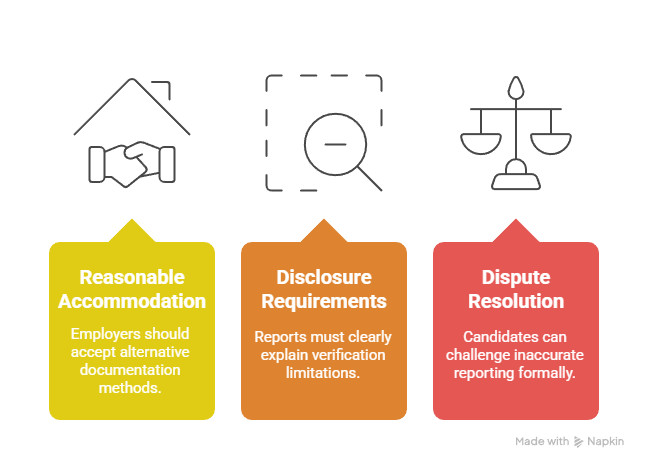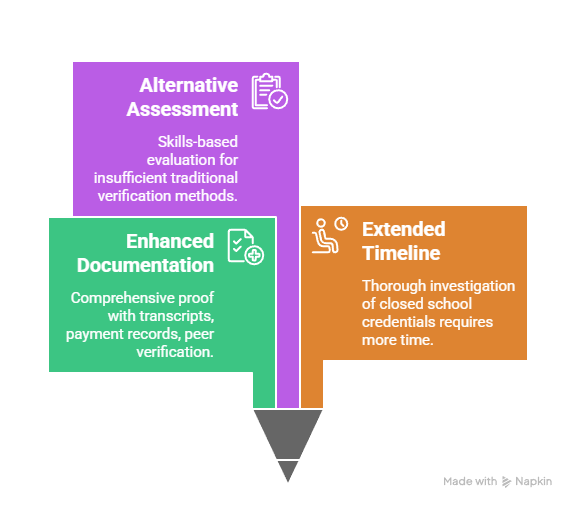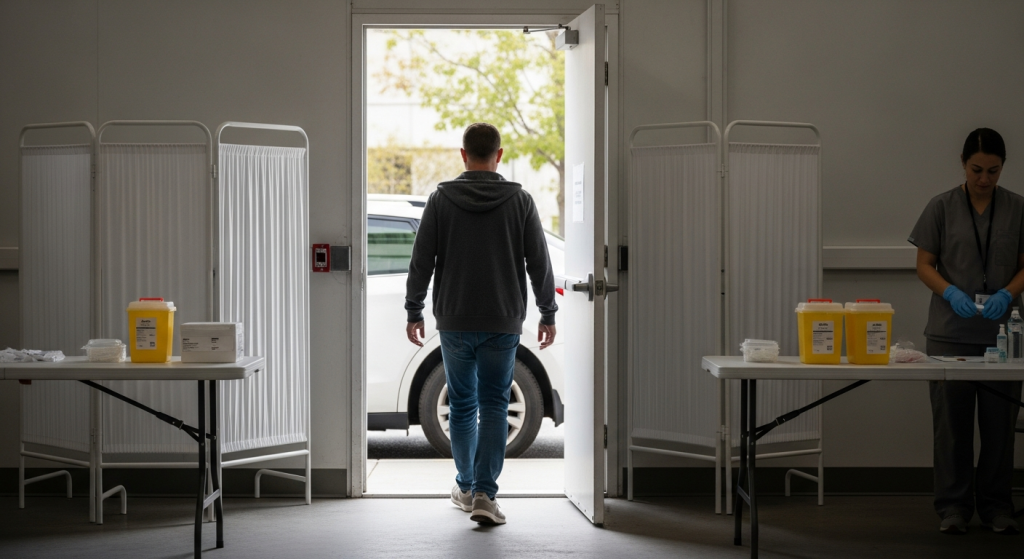When educational institutions close permanently, graduates face unique challenges during employment background checks as traditional verification methods become impossible. Professional verification services and alternative documentation strategies can successfully resolve closed school verification issues for both job seekers and employers conducting due diligence.
Key Takeaways
- Documentation preservation becomes critical when schools close, requiring graduates to maintain transcripts, diplomas, and enrollment records independently.
- Third-party verification services specialize in closed school verification background check processes and maintain archives of defunct institution records.
- State education departments often serve as backup repositories for student records when private institutions shut down unexpectedly.
- Alternative verification methods include professional references, portfolio demonstrations, and competency-based assessments that bypass traditional academic verification.
- Legal protections exist under FCRA guidelines to prevent employment discrimination based on unverifiable education from legitimately closed institutions.
- Proactive communication with potential employers about closed school status demonstrates transparency and professionalism during the hiring process.
Understanding Closed School Verification Challenges
The closure of educational institutions creates immediate verification obstacles for graduates seeking employment. When schools shut down permanently, their registrar offices disappear completely. This makes traditional background check processes impossible for HR departments and staffing agencies. The situation affects thousands of job seekers annually, particularly those who attended for-profit colleges. Trade schools and specialized training programs face higher closure rates than traditional universities.
Employers conducting background verification face similar frustrations when attempting to confirm educational credentials from defunct institutions. Standard verification procedures fail instantly. This creates legal liability concerns and hiring delays. The closed school verification background check process requires specialized approaches and alternative documentation methods. These methods satisfy employment screening requirements while protecting both parties from potential fraud or discrimination claims.
Types of School Closures Affecting Background Checks
Permanent Institutional Shutdowns
For-profit colleges and career training schools experience the highest closure rates in higher education. These institutions often shut down abruptly due to financial difficulties or regulatory violations. These closures immediately eliminate traditional verification pathways. Graduates scramble to obtain proof of their educational achievements. Regional accrediting bodies typically receive advance notice, but student record preservation varies significantly depending on closure circumstances and state regulations.
Program Discontinuation vs. Full Closure
Understanding the difference between program elimination and complete institutional closure impacts verification strategies significantly. When schools eliminate specific programs while remaining operational, registrar services usually continue providing verification for discontinued coursework. However, full institutional closures require entirely different approaches. These often involve state agencies or successor institutions that may have acquired student records during the closure process.
Alternative Documentation Methods for Closed Schools
Graduates from closed institutions should compile comprehensive documentation packages before beginning job searches. Original transcripts serve as primary evidence of educational completion. Additionally, diploma copies and enrollment verification letters provide supporting documentation. Furthermore, maintaining records of tuition payments and financial aid documentation creates supporting evidence for employment verification purposes. Course syllabi also provide detailed proof of completed coursework.
| Documentation Type | Purpose | Retention Priority |
| Official Transcripts | Academic record proof | Critical |
| Financial Aid Records | Enrollment verification | High |
| Tuition Payment Records | Attendance confirmation | Medium |
| Course Syllabi | Curriculum validation | Low |
Professional portfolios demonstrate acquired skills and knowledge when traditional verification fails. Industry certifications carry significant weight with employers. These certifications often matter more than unverifiable degrees from closed institutions.
Third-Party Verification Services for Defunct Institutions
Specialized verification companies maintain extensive databases of closed school records. These services offer solutions for both employers and job seekers. Additionally, they often acquire institutional records during closure proceedings. This creates searchable archives that support ongoing verification needs throughout graduates' careers. The National Student Clearinghouse provides some closed school verification services. However, coverage varies by institution and closure date.
Professional background check companies increasingly offer closed school verification background check services. These services typically cost more than standard verification. Nevertheless, they provide legitimate alternatives when traditional methods fail completely. Turnaround times vary significantly across different providers. Times range from several days to multiple weeks depending on record availability and verification complexity.
Service Types and Features:
- National Database Services: Basic verification through existing records
- Specialized Archives: Comprehensive records from acquired institutional databases
- Legal Documentation: Court-backed verification with official authentication
- Rush Services: Expedited processing for urgent employment needs
These services provide official verification letters accepted by most employers and licensing boards. Job seekers should verify service legitimacy before providing personal information or payment. Fraudulent verification services exploit closed school verification challenges frequently.
State Resources and Record Repositories
Department of Education Archives
State education departments often serve as repositories for student records from closed private institutions. These archives are particularly comprehensive for schools that received state funding. They also cover institutions that operated under specific licensing requirements. These archives provide official transcripts and enrollment verification. Processing times typically exceed standard verification timelines significantly. Contact information and specific procedures vary by state, requiring individual research for relevant jurisdiction requirements.
Successor Institution Arrangements
Some closed schools transfer student records to successor institutions before shutting down operations. Educational partners sometimes receive these transfers as well. These arrangements provide the most seamless verification experience possible. Successor schools often maintain full registrar services for transferred records. Not all closures include such arrangements, making this option unavailable for many affected graduates seeking employment verification assistance.
Legal Protections Under FCRA Guidelines
The Fair Credit Reporting Act provides specific protections for job seekers whose educational institutions have closed permanently. Employers cannot legally discriminate against candidates solely because their schools are defunct. This protection applies provided the original education was legitimate and properly documented. These protections require employers to consider alternative verification methods. They must accept reasonable documentation when traditional verification proves impossible.
Background check companies must follow FCRA procedures when reporting unverifiable education information. They cannot simply report "unverifiable" without explanation. Reports must explain closure circumstances or note legitimate reasons for verification failure. This requirement protects job seekers from unfair employment screening practices while maintaining employer rights to verify candidate qualifications through alternative means.
FCRA Protection Guidelines:

- Reasonable Accommodation: Employers must accept alternative documentation methods in good faith
- Disclosure Requirements: Background check reports must clearly explain all verification limitations and circumstances
- Dispute Resolution: Candidates can formally challenge inaccurate closure-related reporting through established procedures
Understanding these protections helps job seekers advocate for fair treatment during employment screening processes. Documentation of good faith efforts strengthens candidate positions when challenging discriminatory hiring practices.
Employer Best Practices for Closed School Verification
HR professionals should develop specific protocols for handling closed school verification background check situations during candidate screening. Standard verification procedures must include alternative pathways. These pathways accommodate legitimate educational achievements from defunct institutions effectively. Training hiring managers about closure-related challenges prevents discriminatory practices. It also ensures compliance with employment law requirements across all hiring decisions.
| Best Practice Area | Implementation Strategy | Expected Outcome |
| Policy Development | Written procedures for closed schools | Consistent handling |
| Staff Training | Education on FCRA compliance | Reduced legal risk |
| Vendor Relations | Partnerships with specialized services | Faster resolution |
Developing relationships with specialized verification services provides employers with reliable resources for challenging verification scenarios. These partnerships streamline the screening process effectively. They also reduce legal liability associated with incomplete background checks significantly.
Technology Solutions and Digital Verification
Blockchain-based credential verification systems increasingly address closed school challenges. These systems create permanent, tamper-proof educational records. Additionally, they allow institutions to issue digital credentials that remain verifiable even after school closure. While adoption remains limited currently, forward-thinking educational institutions are implementing these solutions. These implementations protect future graduates from verification difficulties effectively.
Digital badge systems and micro-credentials provide alternative pathways for demonstrating specific skills. These credentials show knowledge acquired through closed educational programs. They often carry more practical value than traditional degrees. This is particularly true in technical fields where specific competencies matter more than institutional prestige or comprehensive program completion.
Emerging Technology Solutions:
- Blockchain Credentials: Create permanent verification records that remain independent of institutional status completely
- Digital Badge Systems: Provide skill-specific recognition that employers can verify instantly through online platforms
- Portfolio Platforms: Offer comprehensive skill demonstration tools with integrated verification and employer access features
Early adoption of these technologies benefits both educational institutions planning closure and graduates seeking future employment opportunities significantly.
Industry-Specific Considerations
Licensed Professions
Healthcare, education, and financial services professionals face additional challenges when closed school verification affects licensing requirements. State licensing boards maintain specific procedures for evaluating credentials from defunct institutions. These procedures often require additional documentation or competency examinations. Professionals should contact relevant licensing authorities immediately upon learning of school closure. This contact helps them understand specific requirements and critical deadlines.
Licensed profession verification often involves multiple layers of documentation. These include educational verification, clinical training confirmation, and continuing education documentation. School closures can complicate each verification level significantly. This potentially affects license renewal or interstate practice privileges. Proactive communication with licensing boards helps prevent career disruption and ensures compliance with professional standards.
Federal Employment and Security Clearances
Federal employment and security clearance applications require enhanced verification procedures for closed school situations. Government agencies have established specific protocols for handling defunct institution credentials. These protocols often involve additional background investigation steps. They may also require supplementary documentation beyond standard employment screening requirements.
Federal Verification Requirements:

- Enhanced Documentation: Multiple forms of proof including transcripts, payment records, and peer verification
- Extended Timeline: Additional processing time for thorough investigation of closed school credentials
- Alternative Assessment: Skills-based evaluation when traditional verification methods prove insufficient for clearance requirements
Security clearance investigators receive specialized training in closed school verification procedures. They understand how to properly evaluate alternative documentation methods.
Preventive Measures and Future Planning
Graduates should take proactive steps to protect themselves against potential school closures. Financial instability warning signs include delayed accreditation renewals and staff turnover. Additionally, reduced course offerings and facility maintenance issues signal potential problems. Students should obtain certified copies of transcripts and other records annually. This practice ensures document availability regardless of future institutional stability.
Educational institutions should implement student record protection plans as standard operating procedures. These plans include partnerships with state agencies and successor institutions. They also involve digital backup systems and clear communication protocols for closure scenarios. Proactive planning protects both institutional reputation and student career prospects effectively.
Career professionals should diversify their credentialing approach beyond single-institution degrees. Industry certifications provide verification alternatives that remain valid regardless of educational institution status. Professional portfolio development demonstrates competencies through work samples and project documentation. These approaches reduce reliance on traditional academic verification methods significantly.
Cost Considerations and Financial Planning
Closed school verification background check services involve various costs that job seekers should anticipate in their career planning. Basic verification services range from fifty to one hundred dollars per request. Comprehensive legal verification can cost up to three hundred dollars depending on documentation complexity. Rush services typically add fifty percent to standard pricing structures.
Employers should budget for increased screening costs when dealing with closed school situations. Standard background check packages may not include specialized verification services. Additional vendor relationships and extended processing times affect hiring timelines and budget allocations. However, these costs remain minimal compared to potential legal liability from discriminatory hiring practices.
Cost-Benefit Analysis for Verification Services:
| Service Level | Cost Range | Processing Time | Success Rate |
| Basic State Search | $25-75 | 5-10 days | 60-70% |
| Professional Service | $75-150 | 7-14 days | 80-90% |
| Legal Documentation | $150-300 | 14-21 days | 95%+ |
Financial planning for career transitions should include potential verification costs. Job seekers from closed institutions should budget accordingly. Emergency funds for documentation needs prevent career disruption during critical hiring processes.
Conclusion
Closed school verification background check challenges affect thousands of job seekers and employers annually, requiring specialized approaches beyond standard verification procedures. Alternative documentation methods, third-party verification services, and state record repositories provide viable solutions for most verification needs. Understanding legal protections under FCRA guidelines helps both parties navigate these challenges fairly and professionally. Proactive preparation and clear communication remain essential for successful employment outcomes when traditional educational verification proves impossible.
Frequently Asked Questions
Can employers legally reject candidates whose schools have closed?
Employers cannot discriminate solely based on school closure if the original education was legitimate. They must consider alternative verification methods and accept reasonable documentation under FCRA guidelines.
How long do state agencies keep records from closed schools?
Record retention varies by state, typically ranging from 5-50 years. Contact your state's department of education for specific policies regarding closed institution records in your jurisdiction.
What documents should I keep if my school might close?
Maintain original transcripts, diplomas, enrollment verification letters, tuition payment records, course syllabi, and any certificates earned. Store both physical and digital copies securely.
How much do third-party verification services typically cost?
Costs range from $15-30 for basic services to $75-200 for comprehensive legal verification, depending on complexity and documentation availability.
Can I still use my degree from a closed school on job applications?
Yes, you can list legitimate degrees from closed schools, but be prepared to provide alternative documentation and explain the closure situation to potential employers.
What should employers do when they cannot verify education from closed schools?
Employers should accept alternative documentation, consider position-specific requirements, and may require additional skills assessment or probationary periods instead of automatic rejection.
Do closed school graduates qualify for federal student loan discharge?
Some graduates may qualify for closed school discharge of federal student loans, depending on timing and circumstances of enrollment and closure.
Additional Resources
- U.S. Department of Education - Closed School Discharge Guide
https://studentaid.gov/manage-loans/forgiveness-cancellation/closed-school - National Student Clearinghouse - Degree and Enrollment Verification Services
https://www.studentclearinghouse.org/solutions/business-verifications/ - Federal Trade Commission - Fair Credit Reporting Act (FCRA)
https://www.ftc.gov/legal-library/browse/statutes/fair-credit-reporting-act - SHRM - Conducting Background Investigations and Reference Checks Toolkit
https://www.shrm.org/topics-tools/tools/toolkits/conducting-background-investigations-reference-checks - Professional Background Screening Association (PBSA) - Accreditation Standards
https://www.thepbsa.org/accreditation/
Still have questions?
Get in touch with our team today for a personalized demo and discover how our tailored volume pricing and packages can drive results for your business!
How useful was this page?*
Note: your comments are anonymous. We use them to improve the website. Do not include any personal details.
Visit our FCRA Compliance Tool or leave a message here if you need a response.
From the blog Explore the GCheck Content Hub

Building a Strategic Screening Framework for International Hires in 2026
14 Jan, 2026 • 15 min read
Drug Testing Policies for Remote Employees: A 2026 Compliance and Strategy Guide
13 Jan, 2026 • 21 min read
Best Background Checks for Temporary Workers: A Strategic Framework for 2026
13 Jan, 2026 • 15 min readThe information provided in this article is for general informational and educational purposes only and should not be construed as legal advice or a substitute for consultation with qualified legal counsel. While we strive to ensure accuracy, employment screening laws and regulations—including but not limited to the Fair Credit Reporting Act (FCRA), Equal Employment Opportunity Commission (EEOC) guidelines, state and local ban-the-box laws, industry-specific requirements, and other applicable federal, state, and local statutes—are subject to frequent changes, varying interpretations, and jurisdiction-specific applications that may affect their implementation in your organization. Employers and screening decision-makers are solely responsible for ensuring their background check policies, procedures, and practices comply with all applicable laws and regulations relevant to their specific industry, location, and circumstances. We strongly recommend consulting with qualified employment law attorneys and compliance professionals before making hiring, tenant screening, or other decisions based on background check information.

